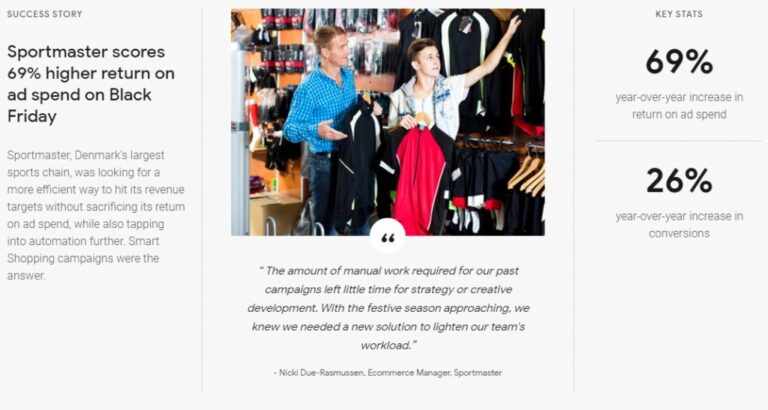If you have ever thought about how to start an online business of your own, now is a great time to finally roll up your sleeves. In the wake of COVID-19, the ecommerce world was flooded with new activity from all sectors. While the acceleration has slowed somewhat since then, there is still a lot of momentum and opportunities.
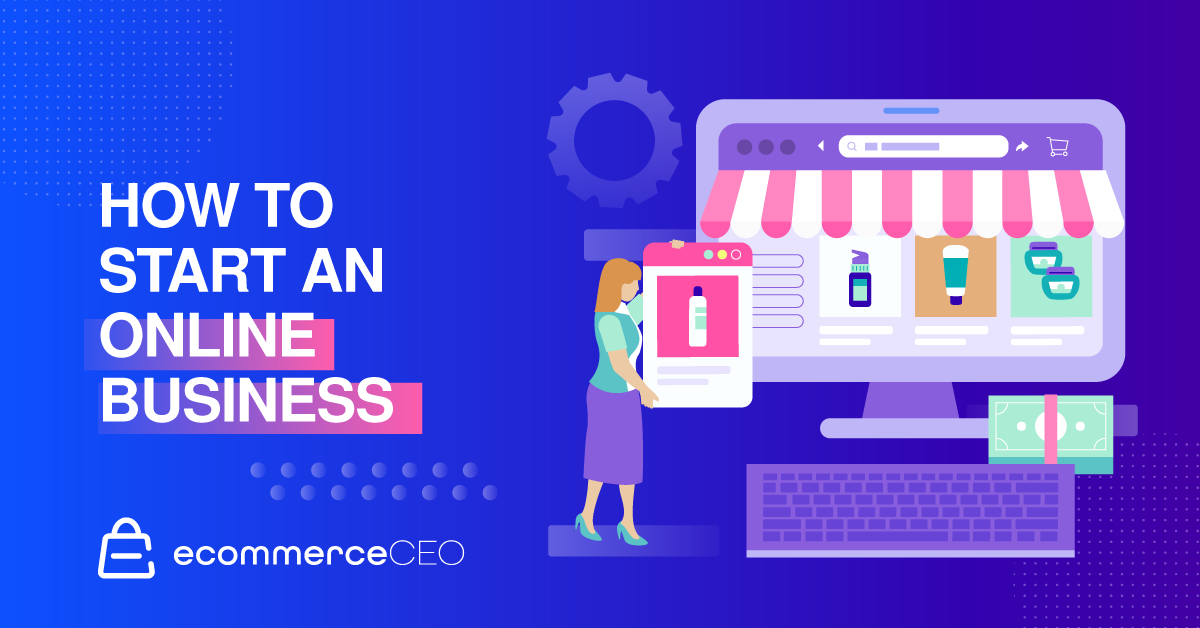
Online business is also becoming more varied, with new ideas and ways of making money. So whether you see yourself running an ecommerce shop, blogging, or becoming an influencer, the internet is ripe with opportunities for entrepreneurial types.
Why Start an Online Business
Online businesses can be extremely profitable with minimal startup costs. The ecommerce market continues to grow, especially in the wake of COVID-19, offering a wealth of opportunities.
Some of the richest people in the world got their start with online businesses, which shows how powerful of an opportunity ecommerce can be. With the right business plan and commitment, you can reach customers worldwide.
Examples of Online Businesses
Online businesses come in all shapes and sizes. From massive ecommerce marketplaces like Amazon to entertainment services like Netflix to independent blogs, you are only limited by your imagination.
Ecommerce Store
An ecommerce store is probably the first thing you think of when it comes to online businesses. These are essentially like any other store, except customers make purchases over the internet rather than in a brick-and-mortar business.
In essence, your website replaces the store. Customers browse your products or services online, make a purchase (usually with a credit card), and you ship their orders to them.
While online stores use different skills than running a physical shop, there are also many advantages. For starters, customers anywhere in the world can shop with you regardless of your business location. Also, the overhead expenses of online stores can be significantly lower than their brick-and-mortar counterparts since you don’t necessarily need to rent a physical storefront.
Dropshipping
A dropshipping business is great for its simplicity. To the customer, they operate just like any other ecommerce store. But in actuality, your internet business is just the middleman.
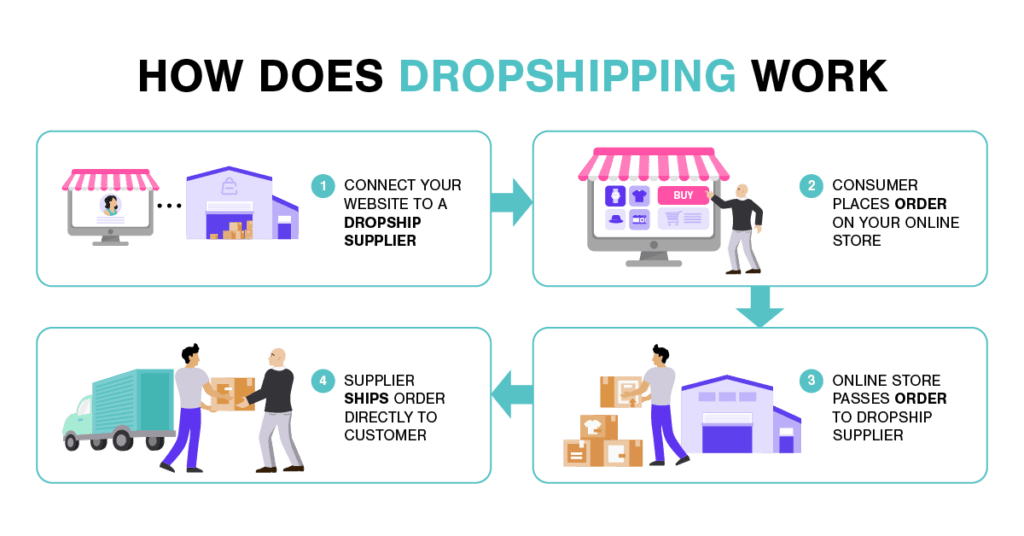
When a customer purchases from a dropshipping business, the order is processed. After that, it is sent to the dropshipper (often the product manufacturer). They are responsible for fulfilling the order and shipping it to the customer.
Become an Affiliate
Similarly, affiliate marketing puts you in a convenient intermediary position where you don’t have to physically handle any products. As an affiliate marketer, your job is to promote affiliate products and drive traffic to the client’s website.
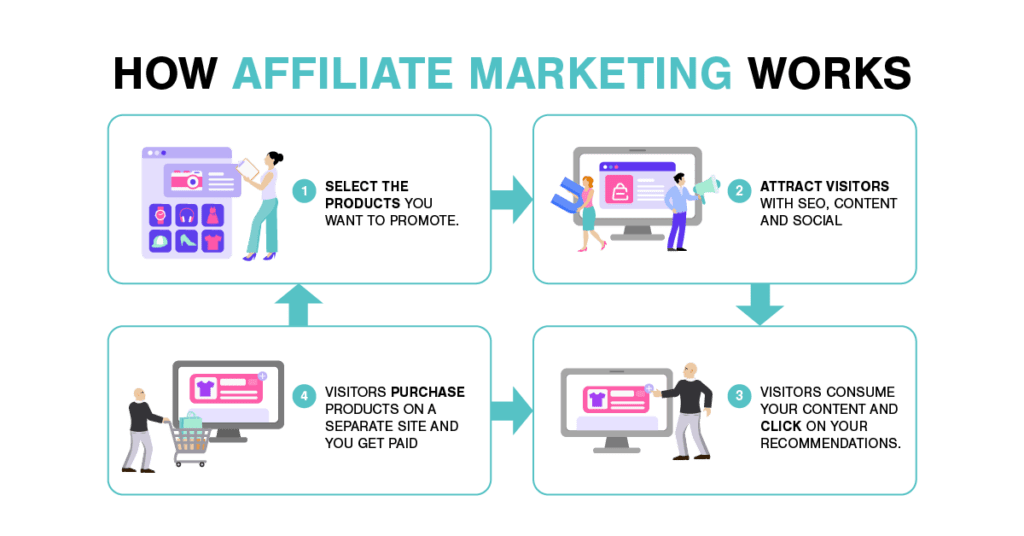
You earn a commission for every customer who follows one of your affiliate links and purchases a qualifying product. The company selling the product handles processing and shipping the order. You are just responsible for encouraging the sale and directing traffic with referral links.
Blogging
Blogging is a large and varied category for online businesses. There is a wide range of blogs and many ways to monetize them. For example, some people make blogs just for a hobby, while others use them for affiliate programs.
Other types of blogs can make money from selling ad space, making sponsored posts, or promoting an ecommerce website. You can even work as a blogger by creating content for other companies’ blogs. Blogging can be great as a part-time job or full-time gig.
Web Design Services
If you have web design skills or experience with app development, countless companies are looking to have a website built. For those with software development knowledge, this can be a very lucrative business to start.
While many tools can help even those without programming knowledge create a website, many business owners still don’t have the time or interest to do the work themselves. This can even include setting up social media accounts on social media platforms like Facebook and Instagram.
How to Start an Online Business From Home
You can start certain types of online businesses with virtually no financial investment from the comfort of your home. All you need is a computer and an internet connection.
For example, you can start promoting affiliate products on social media for free. Even starting a blog or website can be done at an extremely low cost if you know what you are doing.
You won’t want to cut corners in certain areas, such as using a free subdomain versus registering your domain name or using a budget hosting service. Still, you can buy even these for only a double-digit dollar amount.
Other types of businesses can take a little more investment, such as an ecommerce store where you warehouse your own inventory. But again, you could get started with dropshipping to avoid that expense and inconvenience until you get going.
Starting a business online is as easy as you want to make it. Many choose to start slow and build their way up, or you can dive headfirst if you are confident in your online business idea. It really depends on the type of business you want to launch and at what scale.
Start With a Product in Mind
The first thing you need to know, and maybe what motivated you to want to start an online business, is what you will be selling. This could be a product, a service, or an idea.
For example, selling a cool t-shirt design differs significantly from selling a website-building service. Once you know what you want to focus on (this can be multiple things), you can start developing your strategy.
Some questions you will want to ask yourself are:
- What am I selling?
- Do I need or want a website?
- What will my company (and website) name be?
- Will I have stock to manage?
- Do I need to hire anyone?
What you are selling will help answer most of these questions, and surely you will learn and discover things along the way. But first and foremost, what are you selling, and how will you make money?
Conduct Product Research
Whatever it is you are selling, you will almost certainly have competition. Before you get started, it is vital that you do some competitive analysis of the market as a whole. You may want to consider alternatives before entering an industry with direct, established competitors, which is why conducting product research is important. This could make breaking out and capturing a significant market share difficult, stifling your growth potential before you even begin.
Consider what the competition is doing well and what they are lacking to look for opportunities to exploit for your company’s success. Your market research might show that your competitors are pricing their products too high or have poor customer service. If you can do better, that may determine your product viability or suggest another business niche.
Define Your Target Audience
What you are selling will also determine who your target audience is. Are you selling to other businesses or customers? Who are they? What social media platforms do they use?
Defining and understanding your target audience will help shape your overall business and marketing strategy. You should understand that your target market can, and likely will, change over time. There is also often a difference between your ideal customer and your actual customer base.
Analytics tools can be invaluable for identifying your audience and tracking what works and what doesn’t. Who your customers are (demographics and values) will determine how you run your business and make money. It will also have a large impact on social media marketing.
Create Your Business
While you might think of creating your website or other web presence as “starting your business,” there are some steps you will need to take to officially register your company. It is generally okay to begin working on your website or even make a few sales before going through that process, but eventually, you will need to make things official.
Take all Necessary Legal Steps
You will need to address some legal aspects when creating your company. While it may seem like a nuisance, it also protects you when your business is officially registered and licensed. Depending on your business location and the type of products you sell, you may need a permit for business activities. In most cases, you will need a federal business license.
Here are the main legal hoops you will need to jump through:
Register Your Business
Registering your business might sound scary, but it is a relatively straightforward process requiring you to fill out a few forms (and pay the associated fees). Forms you can expect to complete include the following:
- Registering your new business name
- You may also wish to register a DBA
- Selecting a business entity (LLC, non-profit, partnership, etc.)
- A Federal Tax ID (or EIN)
- Other licenses and permits
You can skip many of these steps with a sole proprietorship, which is a good option for many just starting an online business. However, if you are confident in the direction of your business, you can save time and headaches in the future by registering your company with the correct name and business type upfront. A DBA and Federal Tax ID can also provide other perks.
Get Tax IDs
In addition to a Federal Tax ID and federal business license, you may also need to register your company with your state or local government body for tax and licensing purposes.
Get All Necessary Licenses
Depending on the type of business you are launching, there will be licensing requirements at a certain stage. Common business licenses you may encounter include:
- Federal business license
- Sales tax license
- Home occupation permit
- Specific industry licensing
- Permits for regulated products
What you need will depend on your type of business and the products or services you provide. Check with your governing city hall or relevant Small Business Association for help determining what licenses and permits you will need to operate legally. Remember that sole proprietorships can avoid a lot of these requirements.
Note that you may be required to abide by regulations in all areas you do business with, not just where you are located. This is very important for online companies that do business in multiple states or internationally.
Open a Business Bank Account
Opening a business bank account can be a good idea for several reasons. It will help keep your accounting clean and separate your business earnings from your personal savings. Registering your business and Tax ID will allow you to open a bank account under that entity rather than a personal account.
Note that you and your business are the same entity for sole proprietorships, though you can still open another bank account to better manage your personal and company funds.
Choose a Payment Gateway
Whether you sell B2B or B2C, you will need a system for handling payments. Many popular ecommerce tools integrate with third-party payment services, like Stripe, allowing you to collect different forms of customer payment hassle-free.
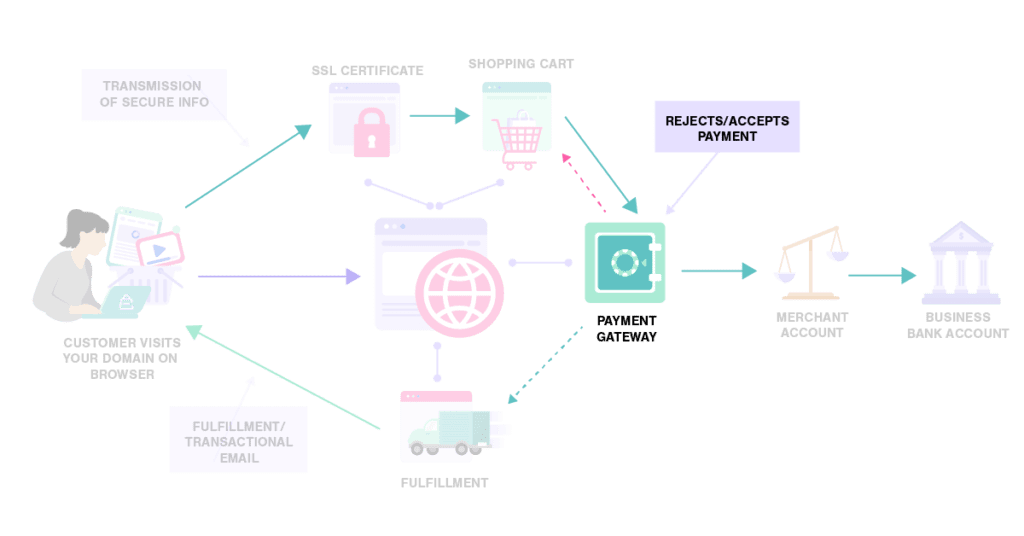
You will need to tie your payment gateway to your business bank account to collect customer funds. Your business location and which ecommerce tools you use will usually determine your payment gateway options.
Set up Taxes
As with any business, you must track your earnings and pay business taxes. You may require an accountant to help you get started and understand the laws governing your business. Either way, keeping clear and accurate records is important, so you are prepared to tax time and potential audits.
Extend Your Store
Once you are up and running and the money is flowing, it is up to you how you want to extend your store. Many brick-and-mortar companies expand with an online presence, though the opposite is also possible. Many online businesses have decided to pursue physical storefronts or simply expand their offerings or website network online.
Social media accounts are a great way to expand your business’s reach for free. Identify which social media platforms your target audience uses and work that into your business model. Influencer marketing can be very effective for online business owners leveraging social media.
Source Products to Sell Online
Assuming you run a traditional ecommerce company, your continued retail sales and profits depend on your ability to supply stock at a fair price.
A common strategy is to order wholesale products in bulk, then resell them individually at a markup. Ultimately, the cheaper you can source your products, the better deal you can offer your potential customers and the higher profit margins you can achieve.
Just be careful that the products you are sourcing are of a quality that reflects your brand.
Build Your Website
Your website serves as your storefront and a direct representation of your company. Building an effective and attractive website is essential for a successful online business. Luckily, there are tools and templates that you can use to build a website without any programming knowledge.
Choose the Ecommerce Platform
The best reason to start an online business today is how easy it is, thanks to the many different ecommerce platforms. Just about anyone can create an ecommerce website without knowing any code, though some general computer skills can be very advantageous.
Popular codeless ecommerce platforms include:
There are others, though these make up the vast majority of websites that aren’t coded from scratch. In fact, WordPress powers roughly 40% of all websites on the internet!
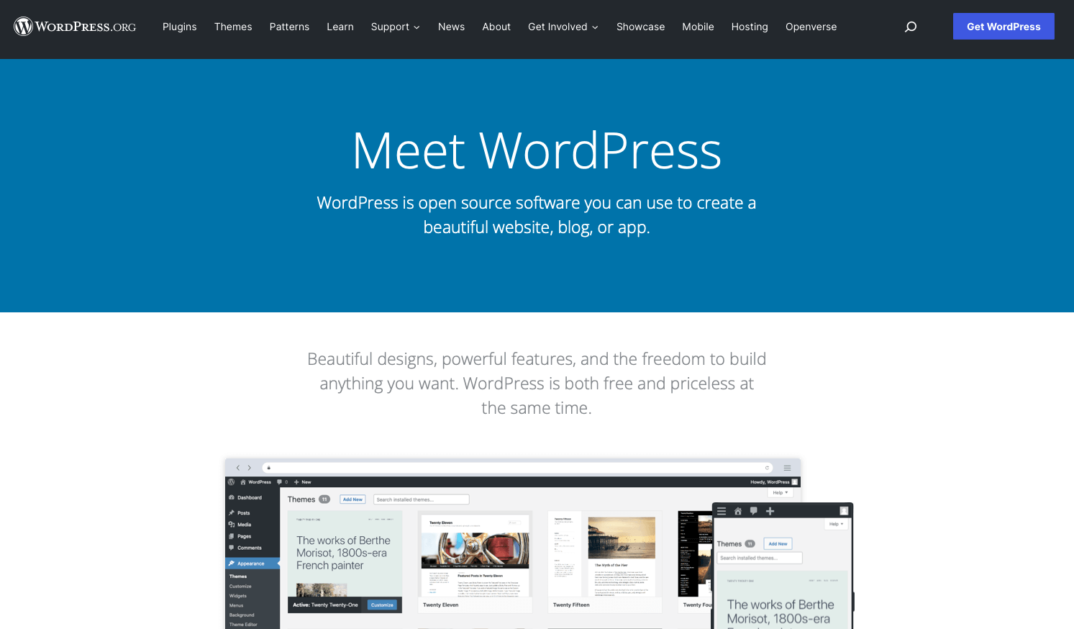
The beauty of WordPress is it is free, open-source software. That means developers can create custom plugins, making WordPress an extremely powerful and flexible option for creating a competitive website without knowing any coding language. With its popularity, you can find step-by-step guides for creating just about anything.
Shopify is an easier website builder for creating a basic ecommerce store, though it will require a monthly fee. It uses simple templates for creating product pages to sell your goods online. This is a popular option among small business owners.
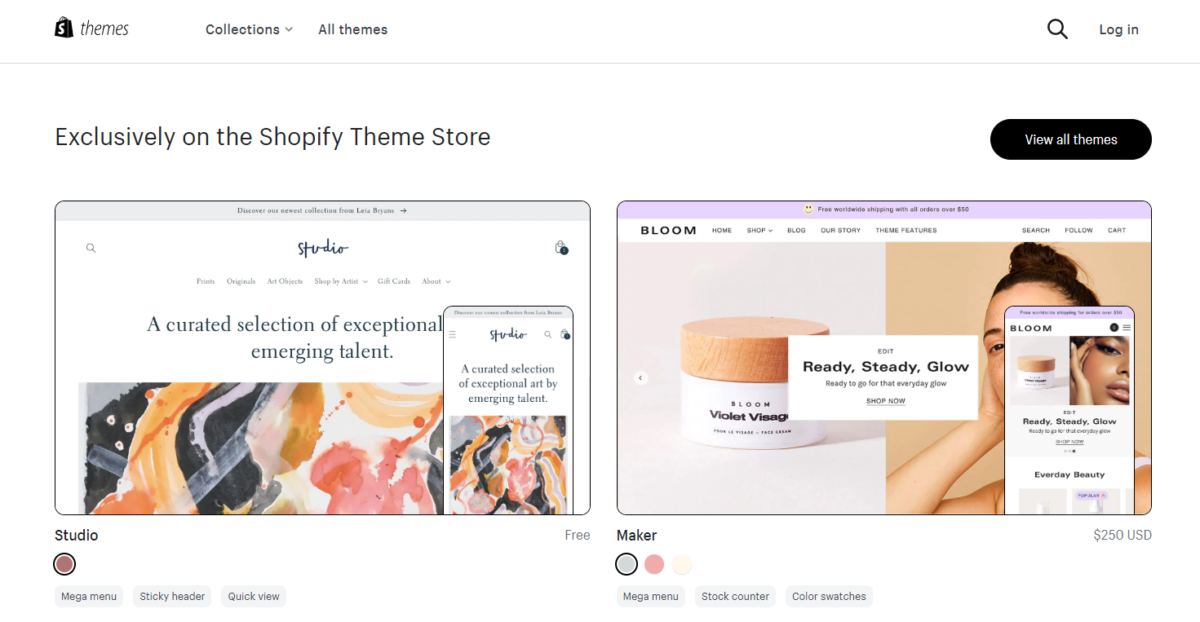
While WordPress is “free,” you should plan for ongoing expenses like your domain, hosting plan, and premium plugins. Finding the right balance of cost and service is key when choosing your ecommerce platform.
Another option is to avoid selling on your own website altogether, utilizing marketplaces like Amazon, eBay, or Etsy to sell your goods. The downside of this business plan is marketplace fees, which can eat into your profits.
Create Pages
No matter which platform you choose, you will need to create enticing product pages to attract shoppers and make retail sales. In most cases, you will also need a quality homepage and effective landing pages to convert search traffic.
Create Products
Of course, any online business that relies on the sale of products will need to create them for populating landing and product pages. This includes pricing, pictures, and product descriptions.
Ship Products and Fulfill Orders
With everything else set up and ready to go. All that is left is to start making sales and fulfilling orders! This is where the day-to-day business operation begins. There are two main functions involved with ecommerce sales: inventory management and shipping.
Inventory Management
Inventory management involves sourcing, receiving, storing, and delivering your goods to customers. This might seem obvious, but it can quickly become overwhelming if you don’t have experience with logistics and purchasing. There is no harm in starting small and building up over time once things run smoothly.
Shipping
Shipping is another seemingly menial task that can quickly become a goliath endeavor. You have to understand that each order placed needs to be pulled, packed, labeled, and handed off to a parcel service. Each of those steps takes time, and when you multiply that by five, ten, or a hundred orders, you might spend most of your time folding boxes and printing shipping labels (not to mention the cost!).
There are some services and software solutions you can use to automate the shipping process, but they can only do so much. This is why hands-off solutions like dropshipping and affiliate marketing can be very attractive early on. It is also important to explore shipping solutions like package pickup and discounted rates to save you time and money.
Define Your Brand and Image
You might have an idea or starting point for defining your brand and company image, but this will likely evolve over time. Just as Amazon grew from an online bookseller to a global marketplace, your brand will likely evolve and settle into its niche.
It is important to listen to your customers and embrace what your business excels at. This will help you connect with your audience and set yourself apart in your market, along with a strong mission statement and quality service.
Market Your Products
Marketing is crucial to help your business grow. There are many ways to market an online business, such as search engine optimization (SEO) to increase organic traffic, paid ads on Google, email marketing, social media marketing, or even partnering with influencers to reach new audiences. Sales and discounts can also be a great way to boost conversions and attract new customers.
Successful Online Businesses You Can Learn From
While every online business is different, there are those that paved the way, and we can learn from their success. Here are some strong ecommerce examples:
Amazon
Amazon has already been mentioned a few times in this article, both directly and indirectly. Why? Because Amazon is the be-all and end-all of ecommerce business. From a small operation selling used books out of a garage to controlling over a third of all ecommerce in the United States, Amazon cannot be ignored.
Amazon followed many of the tips we’ve covered in this article. (You could argue that they wrote the book on successful online business in the modern generation). But Amazon started with a focus on one product category: books. Their target market was internet-savvy people looking to save money and enjoy the convenience of delivery to their doorstep.
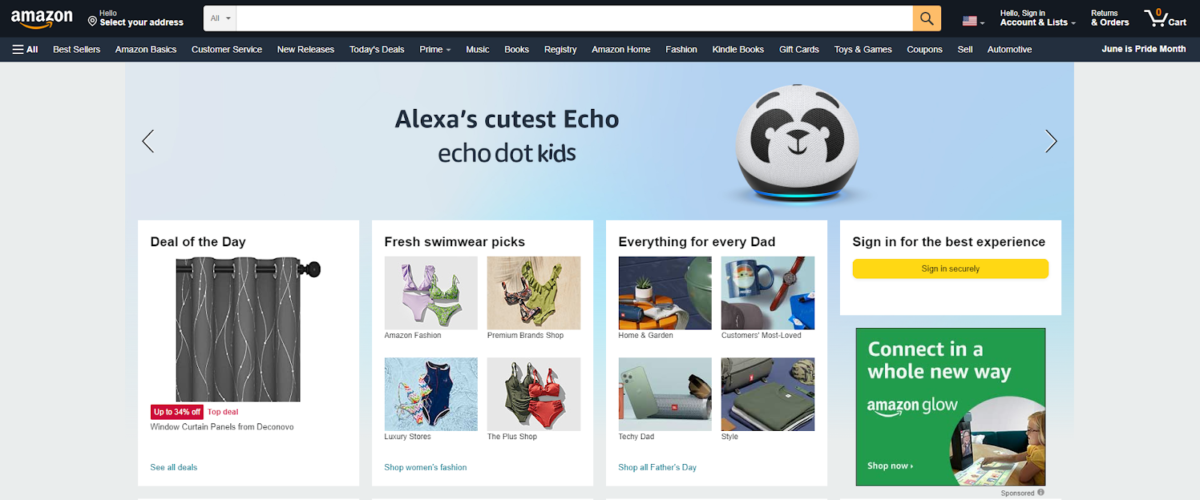
They then embraced their success and continued to grow their brand around those strengths. From there, they expanded into other product categories and now offer countless products and services on their marketplace. We can learn from their success how to stay focused on our strengths and continue to look for opportunities to grow.
Etsy
Etsy is another good example of a simple idea that turned into a huge success. Etsy started as a small online business that focused on the sale of homemade goods. This differed from marketplaces like Amazon, which mainly sold mass-produced items.
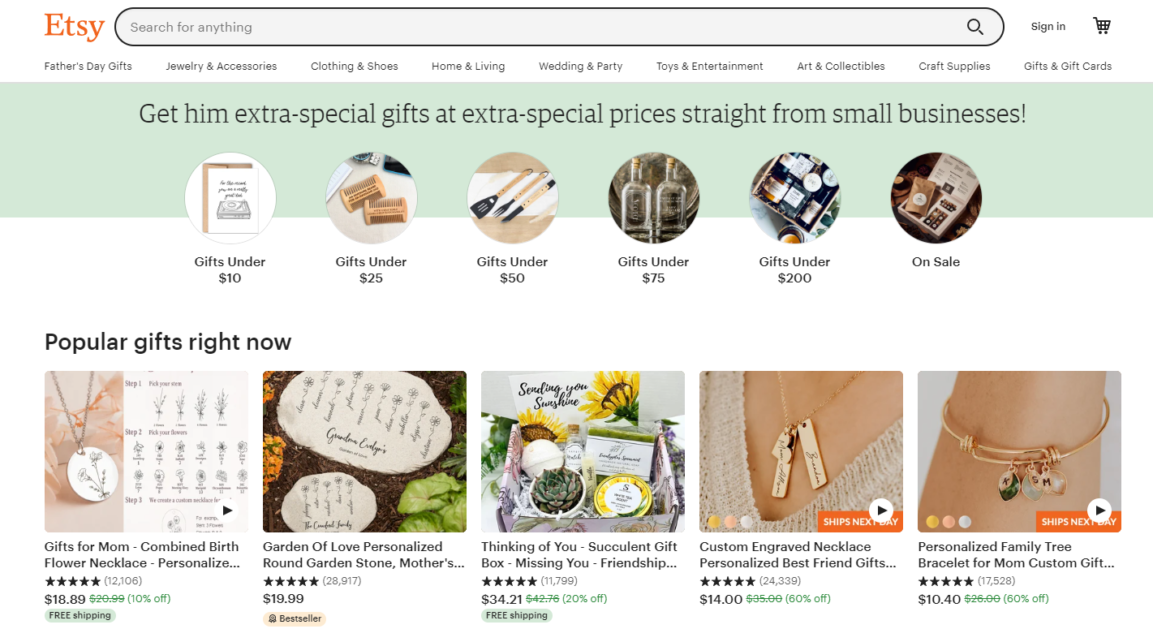
Etsy stayed true to its concept and grew to be an extremely popular platform for artists, crafters, and hobbyists who didn’t want to compete with factory-made goods. Their business model was a success, offering niche products you can’t find anywhere else.
eBay
Ebay revolutionized ecommerce with their new business plan of online auctions. Instead of selling their own products, the business plan was to allow others to safely auction just about anything. This unique idea led to a very successful business and inspired many other ecommerce sites with their entrepreneurship.
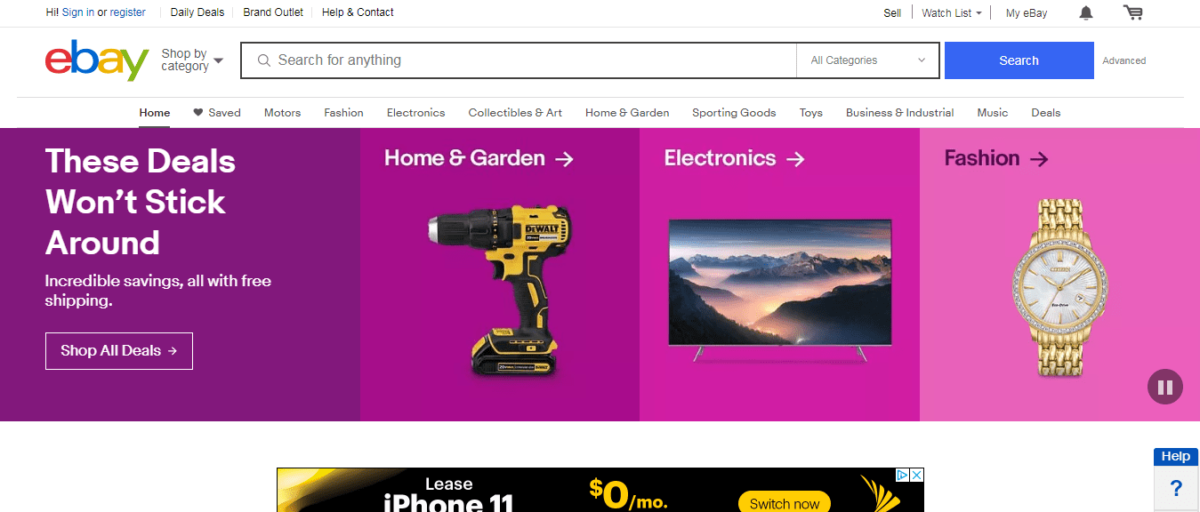
Each of these ultra-popular websites started as a small ecommerce business before making it big. Learning from their success, we can apply the same strategies to our own online business plans.
FAQs
Start Creating Your Online Business
Hopefully, now you are much better equipped to start planning your own online business endeavors. Chances are it won’t be quick, and it won’t be easy, but with a bit of luck and persistence, countless others have launched successful online businesses, and you could too.
Whereas before, it took specialized knowledge and big risks to make money online, there are now abundant opportunities for those looking to break into ecommerce. No matter your strengths or skill level, there is a solution for how to start an online business.


